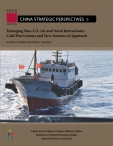 Managing Sino-U.S. Air and Naval Interactions: Managing Sino-U.S. Air and Naval Interactions:
Cold War Lessons and New Avenues of Approach
by Mark E. REDDEN and Phillip C. SAUNDERS
Our analysis does not identify any silver bullet solutions likely to produce an immediate change in PLAN behavior. The more cooperative approaches require time for the benefits of cooperation to accrue and for normative arguments to be heard and heeded, both in China and internationally. (If China follows the Soviet pattern—which is by no means guaranteed—its expanded naval capabilities and operational deployments may eventually produce more parallelism in intelligence operations and greater interest in reducing operational risks through mutual restraint.) Some of the more coercive approaches require violating preferred U.S. norms of freedom of navigation and U.S. military standard practice of safe airmanship and seamanship to generate the leverage necessary to alter Chinese behavior. This risks shifting international norms in undesired directions and would certainly create greater tension and friction in military relations with the PLA and perhaps also in broader bilateral relations. U.S. policymakers will need to carefully consider whether the status quo is tolerable, the costs and risks of various approaches, and what mix of policies might move China in desired directions at an acceptable cost. There is some logic to beginning with softer, more cooperative policy options and holding more coercive options in reserve in case cooperative options fail or Chinese harassment increases. However, some might argue that the United States has already employed some soft options with limited results.
|
19 сентября 2012
Managing Sino-U.S. Air and Naval Interactions: Cold War Lessons and New Avenues of Approach
The United States and China have a complex, multifaceted, and ambiguous relationship where substantial areas of cooperation coexist with ongoing strategic tensions and suspicions. One manifestation involves disputes and incidents when U.S. and Chinese military forces interact within China's Exclusive Economic Zone (EEZ). Three high-profile incidents over the last decade have involved aggressive maneuvers by Chinese military and/or paramilitary forces operating in close proximity to deter U.S. surveillance and military survey platforms from conducting their missions. Why do these incidents continue to occur despite mechanisms designed to prevent such dangerous encounters? Could new or different procedures or policies help avoid future incidents? |
19 сентября 2012
19 сентября 2012